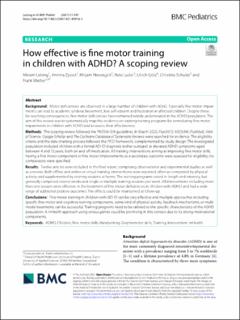Please use this identifier to cite or link to this item:
https://doi.org/10.21256/zhaw-23530Full metadata record
| DC Field | Value | Language |
|---|---|---|
| dc.contributor.author | Lelong, Miriam | - |
| dc.contributor.author | Zysset, Annina | - |
| dc.contributor.author | Nievergelt, Mirjam | - |
| dc.contributor.author | Luder, Reto | - |
| dc.contributor.author | Götz, Ulrich | - |
| dc.contributor.author | Schulze, Christina | - |
| dc.contributor.author | Wieber, Frank | - |
| dc.date.accessioned | 2021-11-22T12:12:50Z | - |
| dc.date.available | 2021-11-22T12:12:50Z | - |
| dc.date.issued | 2021-11-04 | - |
| dc.identifier.issn | 1471-2431 | de_CH |
| dc.identifier.uri | https://digitalcollection.zhaw.ch/handle/11475/23530 | - |
| dc.description.abstract | Background: Motor deficiencies are observed in a large number of children with ADHD. Especially fine motor impairments can lead to academic underachievement, low self-esteem and frustration in affected children. Despite these far-reaching consequences, fine motor deficiencies have remained widely undertreated in the ADHD population. The aim of this review was to systematically map the evidence on existing training programs for remediating fine motor impairments in children with ADHD and to assess their effectiveness. Methods: The scoping review followed the PRISMA-ScR guidelines. In March 2020, PsycINFO, MEDLINE (PubMed), Web of Science, Google Scholar and The Cochrane Database of Systematic Reviews were searched for evidence. The eligibility criteria and the data charting process followed the PICO framework, complemented by study design. The investigated population included children with a formal ADHD diagnosis (either subtype) or elevated ADHD symptoms aged between 4 and 12 years, both on and off medication. All training interventions aiming at improving fine motor skills, having a fine motor component or fine motor improvements as a secondary outcome were assessed for eligibility; no comparators were specified. Results: Twelve articles were included in the final report, comprising observational and experimental studies as well as a review. Both offline and online or virtual training interventions were reported, often accompanied by physical activity and supplemented by training sessions at home. The training programs varied in length and intensity, but generally comprised several weeks and single or multiple training sessions per week. All interventions including more than one session were effective in the treatment of fine motor deficiencies in children with ADHD and had a wide range of additional positive outcomes. The effects could be maintained at follow-up. Conclusions: Fine motor training in children with ADHD can be very effective and multiple approaches including specific fine motor and cognitive training components, some kind of physical activity, feedback mechanisms, or multimodal treatments can be successful. Training programs need to be tailored to the specific characteristics of the ADHD population. A mHealth approach using serious games could be promising in this context due to its strong motivational components. | de_CH |
| dc.language.iso | en | de_CH |
| dc.publisher | BioMed Central | de_CH |
| dc.relation.ispartof | BMC Pediatrics | de_CH |
| dc.rights | http://creativecommons.org/licenses/by/4.0/ | de_CH |
| dc.subject | ADHD | de_CH |
| dc.subject | Children | de_CH |
| dc.subject | Fine motor skills | de_CH |
| dc.subject | Graphomotor skills | de_CH |
| dc.subject | Handwriting | de_CH |
| dc.subject | Intervention | de_CH |
| dc.subject | Training | de_CH |
| dc.subject | mHealth | de_CH |
| dc.subject.ddc | 618.92: Pädiatrie | de_CH |
| dc.title | How effective is fine motor training in children with ADHD? : a scoping review | de_CH |
| dc.type | Beitrag in wissenschaftlicher Zeitschrift | de_CH |
| dcterms.type | Text | de_CH |
| zhaw.departement | Gesundheit | de_CH |
| zhaw.organisationalunit | Institut für Public Health (IPH) | de_CH |
| dc.identifier.doi | 10.1186/s12887-021-02916-5 | de_CH |
| dc.identifier.doi | 10.21256/zhaw-23530 | - |
| dc.identifier.pmid | 34736439 | de_CH |
| zhaw.funding.eu | No | de_CH |
| zhaw.issue | 490 | de_CH |
| zhaw.originated.zhaw | Yes | de_CH |
| zhaw.publication.status | publishedVersion | de_CH |
| zhaw.volume | 21 | de_CH |
| zhaw.publication.review | Peer review (Publikation) | de_CH |
| zhaw.author.additional | No | de_CH |
| zhaw.display.portrait | Yes | de_CH |
| zhaw.monitoring.costperiod | 2021 | de_CH |
| Appears in collections: | Publikationen Gesundheit | |
Files in This Item:
| File | Description | Size | Format | |
|---|---|---|---|---|
| 2021_Lelong_How_effective_is_fine_motor_trainingin_children_with_ADHD_BMC.pdf | 1.38 MB | Adobe PDF |  View/Open |
Show simple item record
Lelong, M., Zysset, A., Nievergelt, M., Luder, R., Götz, U., Schulze, C., & Wieber, F. (2021). How effective is fine motor training in children with ADHD? : a scoping review. BMC Pediatrics, 21(490). https://doi.org/10.1186/s12887-021-02916-5
Lelong, M. et al. (2021) ‘How effective is fine motor training in children with ADHD? : a scoping review’, BMC Pediatrics, 21(490). Available at: https://doi.org/10.1186/s12887-021-02916-5.
M. Lelong et al., “How effective is fine motor training in children with ADHD? : a scoping review,” BMC Pediatrics, vol. 21, no. 490, Nov. 2021, doi: 10.1186/s12887-021-02916-5.
LELONG, Miriam, Annina ZYSSET, Mirjam NIEVERGELT, Reto LUDER, Ulrich GÖTZ, Christina SCHULZE und Frank WIEBER, 2021. How effective is fine motor training in children with ADHD? : a scoping review. BMC Pediatrics. 4 November 2021. Bd. 21, Nr. 490. DOI 10.1186/s12887-021-02916-5
Lelong, Miriam, Annina Zysset, Mirjam Nievergelt, Reto Luder, Ulrich Götz, Christina Schulze, and Frank Wieber. 2021. “How Effective Is Fine Motor Training in Children with ADHD? : A Scoping Review.” BMC Pediatrics 21 (490). https://doi.org/10.1186/s12887-021-02916-5.
Lelong, Miriam, et al. “How Effective Is Fine Motor Training in Children with ADHD? : A Scoping Review.” BMC Pediatrics, vol. 21, no. 490, Nov. 2021, https://doi.org/10.1186/s12887-021-02916-5.
Items in DSpace are protected by copyright, with all rights reserved, unless otherwise indicated.